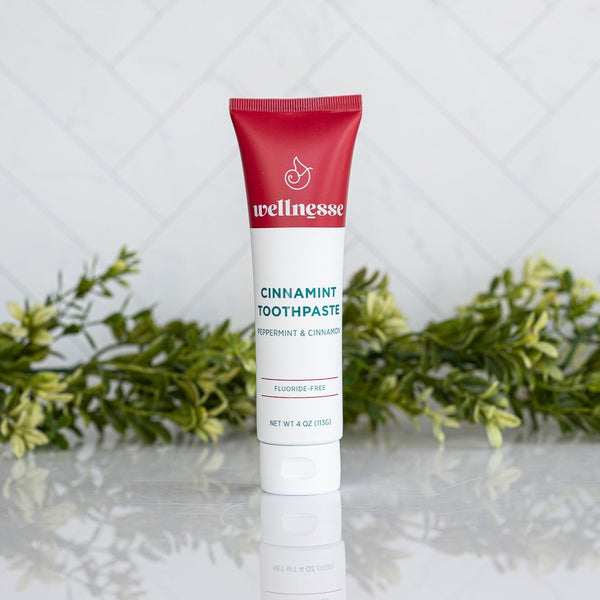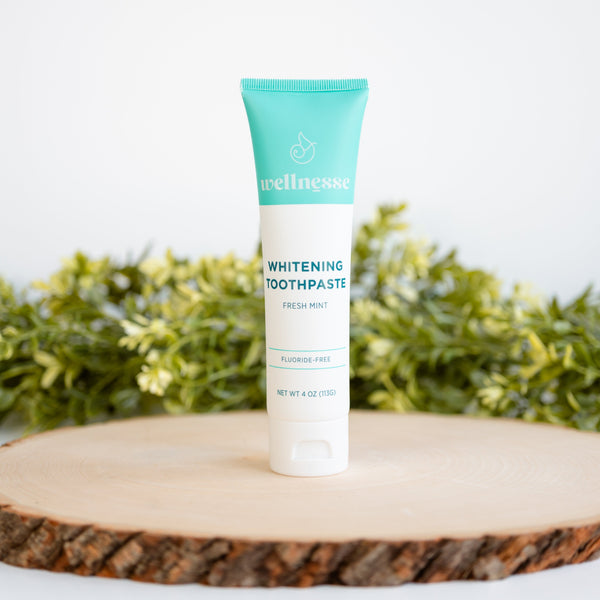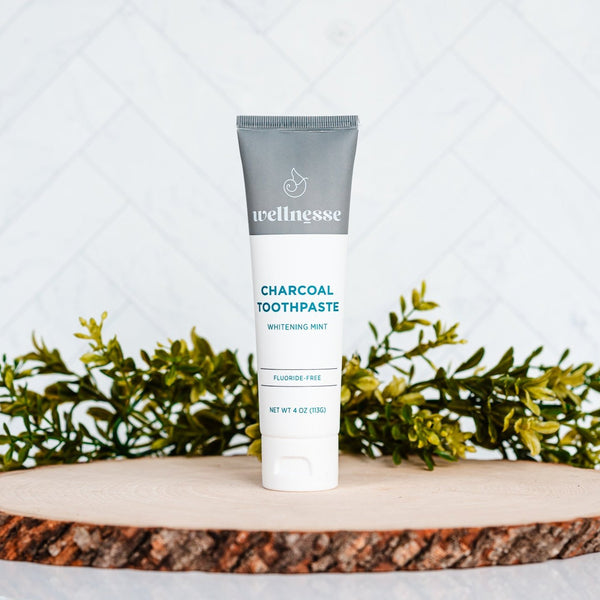The nettle plant is a wildcrafted remedy used for thousands of years across many cultures and medicinal practices. But with the miracle of modern science, new research reveals that this plant offers even more powerful benefits than we ever realized. Nettle boasts countless therapeutic properties, but we love it for all the healing benefits it provides for the scalp and hair!
Jumpstart your hair regrowth with our nettle-infused hair care: Restoring Shampoo and Conditioner!
What Exactly is Nettle?
Nettle, also known as Urtica dioica, is an ancient ingredient with a long historical record of health benefits.
Though it originated in Asia and Europe, the Egyptians were among the first to cultivate nettle as a remedy for pain. Nettle emerged during World War I as a cotton substitute for cloth and as a green dye during World War II. Canadians and residents of the Arctic (where food sources can be scarce) have added the plant to their diets due to its high concentration of micronutrients and fat. Nettle offers many diverse benefits, but it must be handled carefully to be useful.
Nettle is an herbaceous perennial with fine hairs on its leaves and stem, and each of the tiny hairs contains an aggravating chemical. If you’ve handled the plant before, you may have learned the reason behind its alternative moniker, “stinging nettle”. It is also occasionally called “garden nettle” or “common nettle” because it frequently crops up in yards and gardens. Fortunately, removing the ‘stingers’ to make the nettle usable is a fairly simple process. More on that later!
Nettle Benefits
The raw plant isn’t usable until the stinging hairs are removed, but fortunately, it’s a pretty straightforward process. Simply place the nettle into a pot of boiling water, and the heat will deactivate the stinging formic acid. Once this is complete, you’ll be left with just the leaves and stem.
Nettle’s many applications include:
- Elimination: Nettle - especially in the form of nettle tea - is a natural detoxifier and stimulates the body to get rid of waste and excess fluid
- Reducing inflammation and pain: Ranging from arthritis to eczema
- Soothing allergies: While the nettle hairs could themselves trigger an allergic reaction, the nettle leaves and stem are considered a natural remedy to histamine reactions
- Mental health: Nettle contains vitamins and minerals that are believed to support the nervous system and ease stress and anxiety
- Anti-aging: Powerful antioxidants and polyphenols combat free radicals that can increase the appearance of aging
- Hair support: Strengthening the hair shaft and fighting thinning hair by promoting new growth
- Women’s health: Nettle contains vitamins believed to support healthy menstruation, pregnancy, and nursing. However, you should always consult a doctor before taking supplements while pregnant or nursing
- Men’s health/Androgenetic issues: Research is still limited, but nettle seems to help with reduced urinary flow, urinary tract infections, enlarged prostate, and post-urination drip. It's also been studied as an aid in keeping prostate cancer from spreading.
The Breakdown of Nettle
Nettle is extremely nutrient-dense (the reason it is such a commonly used medicinal plant). This plant is also so dense in chlorophyll that it was used - as previously mentioned - as a green dye in World War II.
Chlorophyll's benefits are well-studied. It oxygenates the body, boosts energy levels, is anti-aging, builds blood, and reduces bacteria and inflammation in skin wounds.
The vitamins, minerals, and fat in chlorophyll (as well as the rest of the plant) all work together to accomplish the goal we're excited about (fantastic, fast-growing hair).
The Vitamins In Nettle
Nettle contains multiple essential vitamins, including vitamins A, B, C, and K, all of which work together to provide countless benefits to the hair, skin, and even the immune system!
Vitamin A supports skin health when used topically. It plays a role in moisturizing the skin, boosting the immune system, combating breakouts, and reducing wrinkles or splotches.
B vitamins also help reduce dryness with topical use. It may help with skin aging, inflammatory issues (like itchiness, eczema, and dandruff), combating UV damage, and refining pore size. Although there are many B vitamins, each with their own specific benefits, nettle doesn't just contain one. Instead, nettle contains a B complex, allowing users to benefit from multiple B vitamins.
Topical vitamin C further adds to the anti-inflammatory properties of nettle. It helps accelerate collagen production, benefiting our skin health. This may be important in helping to reduce hair loss.
Vitamin K has often been used topically to aid the skin in repairing itself and even in cases of bruising or swelling.
Minerals in Nettle
Iron, phosphorus, sodium, calcium, potassium, and magnesium work together to make nettle a mineral powerhouse.
Iron plays a critical role in blood. Specifically, it facilitates oxygen transport from our lungs to the rest of our bodies. Without enough iron, we lack healthy red blood cells to oxygenate the body properly. A severe iron deficiency can negatively impact the entire body, including the hair.
Phosphorus helps the body manage and use its stored energy. It can help filter out kidney waste, reduce soreness from exercise, and produce DNA. In addition to that, it helps grow and repair tissues throughout the body. Phosphorus aids calcium in producing hydroxyapatite, which, in turn, strengthens and protects our teeth and bones. Proper phosphorus levels are also important for regulating hair growth down at the root.
Having enough sodium (salt) in our systems is essential to retaining hydration, keeping bacteria at bay, conducting nerve impulses, and even contracting or relaxing our muscles. Too much sodium can build up and block your hair from receiving nutrients, but just the right amount can contribute to healthy, natural volume!
Healthy calcium levels aid healthy, thick hair growth. A calcium deficiency can lead to dullness and flatness in the hair and even stunted growth.
Potassium is another mineral that supports our overall health. While it’s often referenced regarding blood pressure, it's also helpful in combating hair loss.
Magnesium might be the most popular mineral when it comes to hair health. Sometimes calcium can clog up hair follicles and begin the hair loss process. Magnesium cleans up calcium deposits and promotes follicle growth.
How the Nutrients in Nettle Work Together
All these nutrients support beautiful, healthy hair in a few simple but fascinating ways.
Chlorophyll is an anti-inflammatory on the scalp (and inflammation is often a source of hair loss). Nettle may even help combat baldness by regulating DHT and halting the overproduction of testosterone, which can cause scalp inflammation.
Magnesium cleans out excess calcium and works alongside the anti-inflammatory properties of nettle by regulating follicle growth. A healthy amount of sodium can create natural volume, but too much can cause blockages in the hair follicle, leading to hair loss. In that case, potassium can be instrumental in clearing out sodium build-up and supporting hair growth by balancing the minerals.
While those minerals keep hair in an optimal range of health, the vitamins add other benefits. Vitamin K prevents swelling and bruising in the scalp. Vitamin C supports collagen production, thus aiding the growth of healthy new hair.
Vitamin A fights wrinkles and dryness by retaining the moisture in our skin. It's tough for dehydrated skin to grow new hair!
These nutrients also improve scalp circulation and provide antimicrobial functions, protecting the scalp from harmful bacteria.
Getting Started on Regrowing Your Hair
Grabbing your favorite pair of gardening gloves and a bag to collect fresh nettle in the backyard is a great way to spend an afternoon. Who doesn’t love a bright, sunny day of gardening? But it is tedious, and you may get stung if you aren’t careful. If gardening isn’t your style, you can always purchase raw nettle leaf extract and develop your own hair rinse or hair care formula! Still, sourcing all the right ingredients and experimenting with recipes takes a lot of time, trial, and error.
So we did all the hard work for you! We combined the benefits of clean, ethically-sourced nettle with all our favorite ingredients (like quinoa and argan oil!) to create powerful, all-natural formulas that are like food for your hair!
Get ready for your best hair day every day!
Resources
1. Kregiel, D., Pawlikowska, E., & Antolak, H. (2018). Urtica spp.: Ordinary Plants with Extraordinary Properties. Molecules (Basel, Switzerland), 23(7), 1664. https://doi.org/10.3390/molecules23071664
2. Wells, Katie. (2020, February 26). 8 Benefits of Stinging Nettle (& How to Use It in Tea, Tonics, Haircare & More). Wellness Mama. https://wellnessmama.com/4807/nettle-herb-profile/
3. Stinging Nettle. (n.d.). Retrieved from http://bchhc.adam.com/content.aspx?productid=107&pid=33&gid=000275
4. Cormick, G., & Belizán, J. M. (2019). Calcium Intake and Health. Nutrients, 11(7), 1606. https://doi.org/10.3390/nu11071606








